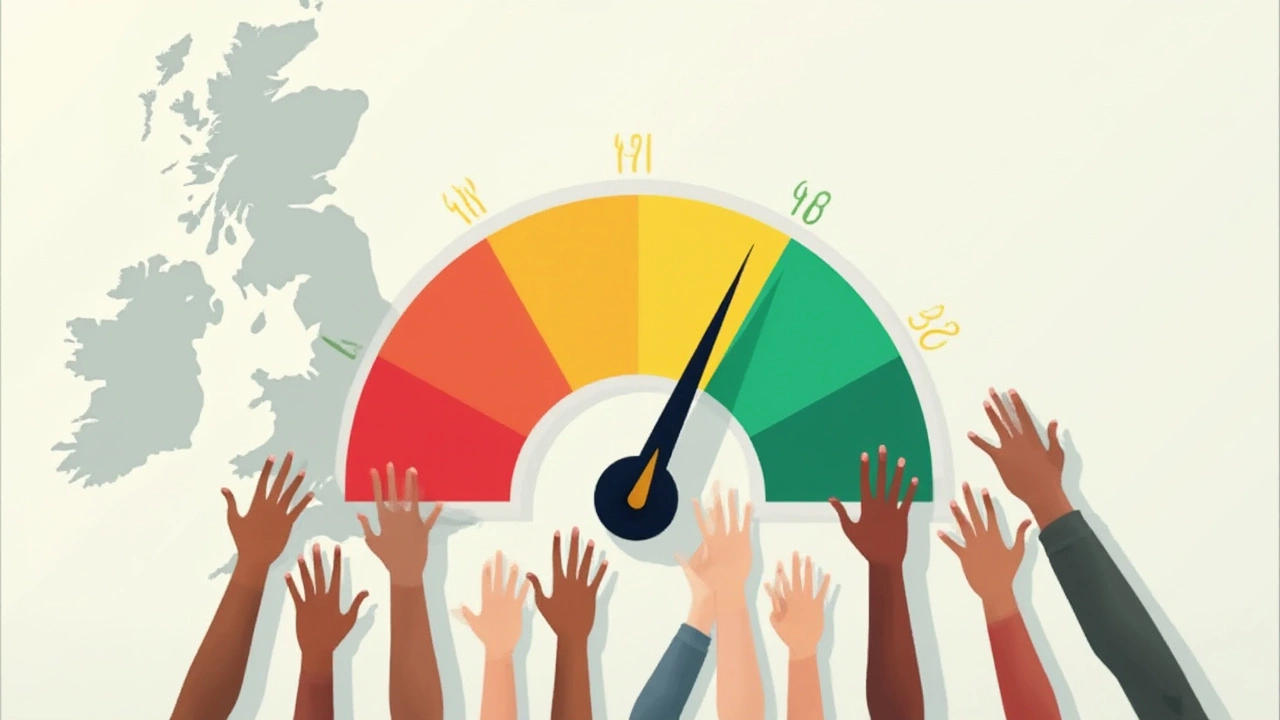Here’s a truth that trips people up: your credit score doesn’t just decide if you can buy a car or get a fancy rewards card—it determines whether you can finally bundle your debts into one, simple payment. Debt consolidation sounds like an escape hatch, but banks guard it like a dragon guards its gold. Some folks get through the gates with no sweat, while others get stuck bouncing between rejected applications. So, what score actually gets you in? Let’s cut through the fog, look at hard numbers, insider tips, and how lenders view your hopes of rolling all those payments into one neat bundle.
How Credit Scores Work: The Gatekeepers to Debt Consolidation
A credit score is basically your financial SAT. In Ireland and most of Europe, lenders generally use the Central Credit Register (CCR), while in the US, the numbers come from Experian, Equifax, and TransUnion, running from 300 to 850. Banks and credit unions see your score as a quick summary of your debt habits: do you pay bills on time? Do you juggle too many loans? Did you run up the credit card after payday? It’s like a financial report card, and for debt consolidation, it’s more important than that motto you put on your CV.
So what’s the magic number? Here’s a breakdown you’ll run into with most lenders:
| Score Range | Lender Reaction | Typical Rates |
|---|---|---|
| 750 and above | Easy approvals, best rates | 5%–8% |
| 700–749 | Likely approval, good rates | 8%–14% |
| 640–699 | Maybe, but rates rise | 14%–23% |
| 600–639 | Possible, but tough; higher fees | 23%–30% |
| Below 600 | Rarely approved, high risk | Often denied or very high rate |
If you’re in Ireland, most banks like AIB, Bank of Ireland, and credit unions don’t announce cutoffs. But interviews with loan managers make it clear: under 600 (in VantageScore or US FICO terms) and you’re looking at tight odds and possible rejection—unless you opt for a guaran-tor or use a secured loan. Mid-600s to low 700s gives you a real shot. Over 740, and bankers usually start offering tea and bikkies.
Think you’re close but not quite there? Payment history makes up about 35% of your score. One missed card payment can slam your rating by 90 points. On the plus side, catching up—setting calendar reminders, autopay, whatever it takes—can tip the scales fast. According to a 2024 survey by the Irish League of Credit Unions, almost half of successful applicants had worked on cleaning up their track record in the 12 months before getting consolidation approved.
Don’t forget: your debt-to-income ratio (DTI) often matters almost as much as your score. Even if your score looks fine, lenders want to see you’re not juggling more payments than your paycheque can handle. Many aim for 35% DTI as the upper safe limit. If yours is higher, they might say no or offer a smaller loan than you need.

Behind the Scenes: What Lenders Check (And What Surprises Applicants)
Lenders are like detectives digging through your finances. They don’t glance at your score and rubber-stamp you through. They’re scrutinizing everything—want to know what stands out?
- Steady Income: Got a permanent job or at least steady freelance gigs? You’ll fare better than someone hopping from zero-hours contracts. They want to see you can keep up payments.
- Open Accounts: Too many open credit cards—even if unused—can freak lenders out. It hints you could suddenly run up more debt.
- Recent Applications: If you’ve been shopping for loans all over town, each one triggers a “hard inquiry.” Stack up a few in quick succession and your score can tumble briefly by 5–10 points per check.
- Credit Mix: If you’ve only ever used a store card or overdraft, lenders get nervous. They prefer to see you juggling a mix—like a credit card and a personal loan—and paying both reliably.
A weird but true fact: in a 2023 survey by Bankrate, 68% of rejection letters cited "insufficient credit history" as a top reason, above even missed payments.
For secured loans (where you offer your car or home equity as backup), the approval bar drops—sometimes as low as 580—because the bank has something to grab if things go sideways. But be careful. Lose the loan, and you could lose the asset.
Something else: Your relationship with the lender matters. If you’ve been using the same credit union for years, paying off loans like clockwork, you might see more leeway. That “local history” can nudge your application over the line even when your score isn’t perfect.
I’ve seen people get stuck because they forgot to update their address. Your CCR report or credit file in the UK can stall an application if personal details don’t match up. Double-check them before you apply. A silly typo has dashed many hopes.
If you’re self-employed, thick pay slips don’t help—but a stack of bank statements showing steady deposits usually does the trick.
And don’t forget the paperwork. Even after preapproval, lenders might ask for tax returns, proof of rent, or utility bills. Missing docs can slow you down or even kill your chances, so assemble the lot before you click ‘apply.’

Can You Boost Your Score (And Your Odds) Fast?
Let’s be honest, waiting years to fix your score feels like torture. But there are things you can do in weeks, not months.
First, pay down high-balance cards. If your credit utilization—the chunk of your available limit you’re using—is over 30%, your score is taking a hit. Even bringing it from 60% down to 30% on a single card can boost your profile by 20 points or more. Pay on time, every time—set reminders if you must. Even one late payment in the past six months can ding your record.
Next, don’t close cards just to tidy up—keep them open, but don’t use them much. Closing accounts can shrink your available credit, making your utilization jump overnight. Leave old cards open unless they carry nasty fees.
- Dispute errors on your credit file. Found a mystery loan or an overdue payment you never made? Raise it with Experian or the CCR. Their official complaint process sorts it electronically in Ireland or the UK. Legitimate errors—like someone else’s default showing up—can vanish from your record in a few weeks, adding instant points to your score.
- Increase your limits without spending more. A ten-minute call to your credit card provider asking for a higher limit (if you have a decent payment history) can help by lowering your utilization. Just promise yourself not to use it.
- Add a utility or mobile bill to your credit file where possible. Some services—like Experian Boost—let you report on-time phone or electric payments, nudging your score up by including that positive data.
In Ireland, you can request your free CCR report online and from the major credit bureaus. Pull it at least twice a year to spot errors. Don’t wait for a lender to do it—you want time to fix things before they see the blemishes.
Timing helps too. If you just cleared a bad debt or paid off a loan, wait a couple of months before applying. Your score often jumps up once bureaus record the repayment. Don’t try to game the system, but if you can time your application right, those extra few points make a lot of difference in the interest rate the lender will quote.
If you’re serious about debt consolidation, get your documents lined up: three bank statements, your most recent payslips, proof of address, and official ID. The faster you move when a lender asks, the more likely you’ll look organized and get a thumbs-up.
Finally, consider talking with a free debt adviser or using comparison tools that show acceptance odds. Most Irish banks publish ballpark rates, but the devil’s in the details. You can drop a quick, anonymous application through a broker who knows lender quirks—sometimes they’ll push your case even if you’re just on the edge of acceptable. It’s not cheating; it’s playing smart.
Debt consolidation can feel like a pipe dream if your score is wobbly, but a few clever moves—and avoiding rookie mistakes—can tip the scales. The higher your score, the better your options and the lower your stress when those monthly bills hit the doormat. Getting in is part science, part hustle. So check those scores, tidy your paperwork, and make your odds count.
